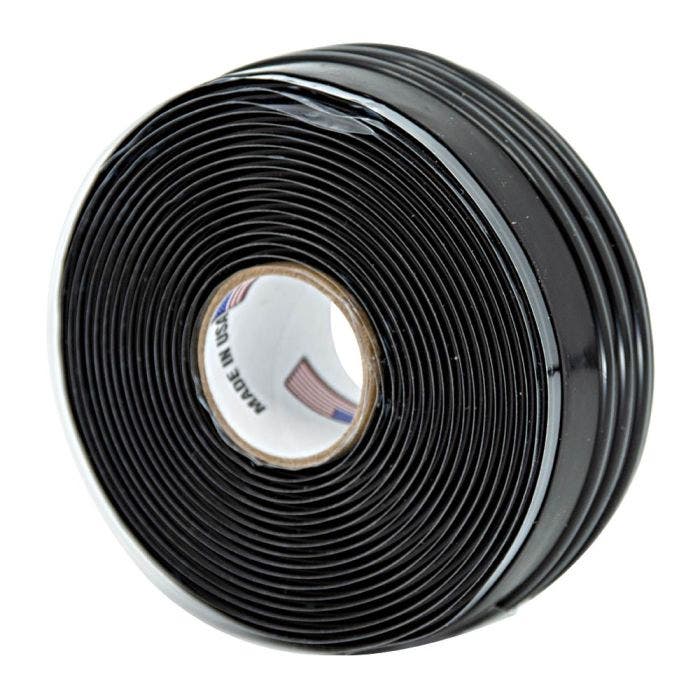Self Fusing Silicone Grip Wrap Black by A.M. Leonard
In stock
SKU
ATT22
$19.32
SEE ALL TIER PRICING
Buy 3 for $19.02 each and save 2%Buy 6 for $18.85 each and save 2%
READ MORE...
Product Information
Product Specs
- Color: Black
- Width: 1 1/8 inches
- Thickness: 20 mils
- Roll Length: 10 feet
- Substrate: Self-fusing silicone
- Insulation: Up to 8,000 volts
- Resistance: UV, oil, salt, and chemical degradation
- Temperature Range: -65F to 500F
- Stretch: More than 300%
- Application: Tools, irregular shapes, fittings
- Bond Time: Seconds
- Removal: Easily with a knife, no residue
- Country of Origin: USA
- Warranty: Lifetime
Product Warranty Information
- This product is covered by A.M. Leonard's Down-to-Earth guarantee. Click here for more details.
Product Features
- Get a grip with our grip wrap!
- Leonard Self Fusing Silicone Grip Wrap features a unique 3 ridge profile.
- This black wrap measures 1 1/8 inches in width and 20 mils in thickness.
- Instead of bonding to a substrate, this wrap binds to itself to create an airtight and waterproof seal.
- Sold in 10 foot rolls.
- Leonard Self Fusing Silicone Grip Wrap is the perfect solution for extreme environments.
- It insulates up to 8,000 volts resists UV, oil, salt, and chemical based degradation.
- This wrap is ideal for nearly any tool from a hammer to a D grip spade.
- Applying several layers of this wrap dampens impact, protecting your hands from injury.
- We design this wrap to last.
- It holds up during extreme temperature fluctuations from 65F to 500F and stretches more than 300%.
- It forms around irregular shapes and fittings and bonds into a solid layer within seconds.
- You can remove it with a knife easily without dealing with any messy residue.
- We make this wrap in the USA and back it with our lifetime warranty!
Product Shipping Weight
- 0.1 pounds
Frequently Asked Questions
What are some popular types of plants for landscaping?
Popular choices include low-maintenance plants such as succulents, ornamental grasses, and shrubs like boxwood and holly. Trees like oak and maple are also common choices for landscaping.
How often should I water my plants?
This can vary depending on the type of plant, soil, and climate. Generally, it's best to water when the top inch of soil feels dry to the touch. It's better to water deeply and less often than shallow and frequently. In hot weather or dry climates, plants may need more frequent watering.
What are some natural pest control methods for my garden?
You can try companion planting - planting certain plants that naturally repel pests near the plants that are vulnerable to them. Garlic, chives, and marigolds are good examples. You can also try using natural repellents like neem oil or insecticidal soap.
How can I create a low-maintenance garden?
Choosing plants that require little watering, pruning, or fertilizing can significantly reduce maintenance. You can also use mulch to help retain moisture in the soil and prevent weed growth. Consider using hardscaping elements like stone or gravel pathways to reduce the amount of grass or plants that need care.
Popular choices include low-maintenance plants such as succulents, ornamental grasses, and shrubs like boxwood and holly. Trees like oak and maple are also common choices for landscaping.
How often should I water my plants?
This can vary depending on the type of plant, soil, and climate. Generally, it's best to water when the top inch of soil feels dry to the touch. It's better to water deeply and less often than shallow and frequently. In hot weather or dry climates, plants may need more frequent watering.
What are some natural pest control methods for my garden?
You can try companion planting - planting certain plants that naturally repel pests near the plants that are vulnerable to them. Garlic, chives, and marigolds are good examples. You can also try using natural repellents like neem oil or insecticidal soap.
How can I create a low-maintenance garden?
Choosing plants that require little watering, pruning, or fertilizing can significantly reduce maintenance. You can also use mulch to help retain moisture in the soil and prevent weed growth. Consider using hardscaping elements like stone or gravel pathways to reduce the amount of grass or plants that need care.
Write Your Own Review



